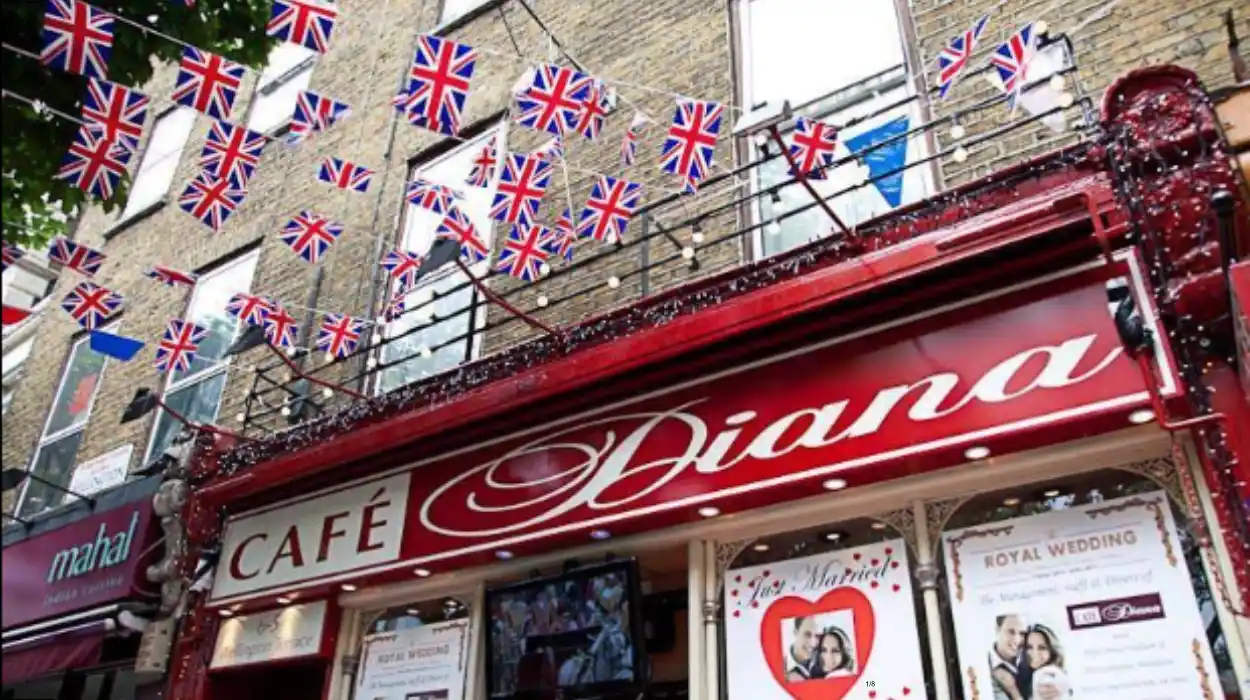Kensington & Chelsea (Parliament Politics Magazine) – A Princess Diana-themed café in Notting Hill, Kensington & Chelsea, faces closure after authorities found it employed illegal workers.
According to a Home Office assessment, immigration inspectors discovered that employees at Café Diana on Wellington Terrace were paid “in food” or as little as £5 per hour.
The department demanded that Kensington and Chelsea Council cancel the café’s license after claiming that the license holder and its representatives had regularly neglected to do right-to-work checks.
They wrote:
“Merely remedying the existing situation (for instance by the imposition of additional conditions or a different Designated Premises Supervisor), is insufficient to act as a deterrent to the licence holder and individuals involved in the management of the business from employing workers that lack the relevant permission to work in the UK.”
The license holder, SSW6 Holding Ltd, stated that it has subsequently evicted the café’s operator and agreed to close the business for three months in order to make the necessary adjustments.
Between September 2019 and May 2025, immigration enforcement officers conducted four raids at Café Diana.
Seven illegal workers from Egypt, Iran, and Albania were discovered, and it was revealed that one worker received £40 for an eight-hour shift, or £5 per hour.
During two different raids, they came across one illegal worker and discovered another who had been employed by Café Diana for two and a half years.
The same Home Office report said:
“During interviews conducted with workers, it was revealed that one illegal worker had been employed at the premises for over two years. This prolonged period of illegal employment is significant as it indicates a persistent undermining of the prevention of crime and disorder licensing objective.
It was also noted workers admitted to being compensated with food instead of monetary payment, which raises concerns about labour exploitation taking place at the premises. Such practices not only exploit workers but provide an unfair competitive advantage over businesses that adhere to wage regulations.”
The West London café was fined £10,500 in February 2020 for employing unlawful workers, according to the Home Office. For the same offense, it was fined an additional £135,000 in December 2024.
An unlawful worker who had overstayed a visa that had expired in May 2015 was discovered by immigration officials when they visited the café in September 2019. In February 2020, officers returned and discovered three more undocumented workers.
One attempted to avoid the officers by going to the restrooms, but then acknowledged that he was paid £50 in cash for doing five eight-hour stints per week. The owner urged her to file for immigration documents after she “pleaded” for a job. She had illegally entered the UK in 2015 via a lorry, according to Home Office checks.
Another claimed to be compensated in food after overstaying a July 2015 business visit visa. Since then, he has applied for and is awaiting a protection visa. He was not entitled to work.
Then, on May 9 of this year, immigration officers, Met officers, and the Trading Standards team of Kensington and Chelsea Council confiscated 45 tubs of illicit shisha tobacco and discovered that smoking was occurring in places that were not permitted for smoking.
Abdul Basit Daoud, the DPS, acknowledged hiring employees from abroad in many conversations with immigration officials, but he insisted that all new personnel had to complete a starting checklist. They were all subjected to right-to-work checks, he claimed.
He also admitted the CCTV on the premises did not work. In its submission to the council, the Home Office wrote:
“It is clear to see that the premises licence holder/DPS along with management has failed to conduct mandatory employment checks in line with legal obligations to prevent illegal working.
It is an offence to work when a person is disqualified to do so, and such an offence can only be committed with the co-operation of a premises licence holder or its agents. The management could have eradicated any doubt concerning right-to-work by the simple task of acquiring a share-code from potential employees.”
He also proposed hiring door security, carrying out regular immigration checks, and improving CCTV and training for staff. He wrote:
“Our client fully understands that implementing the proposed comprehensive conditions effectively requires adequate preparation, policy development, and procedural implementation.
Therefore, we respectfully suggest that a suspension of the premises licence for a period of three months would represent an appropriate and proportionate response.”
Mr. Daoud, whose business, The Corporate Meeting and Event Services Ltd., operated the café until recently, was contacted by the Local Democracy Reporting Service (LDRS). In June, the business was liquidated.
The license for Café Diana will be reviewed during a meeting of Kensington and Chelsea Council on Thursday, July 3.
This little restaurant, which was named Café Diana in honor of the late Princess, has drawn hundreds of patrons, including members of the royal family.
In truth, Lady Di was a regular supporter and guest until her death. She apparently thought highly of the place and frequently came for breakfast and coffee with her two sons.
How might the closure affect its royal-themed reputation?
The café is a well-known and beloved location because of its connection to Princess Diana and the visits of Princes Harry and William. Legal issues, particularly those pertaining to unlawful employment and illegal tobacco sales, could damage the company’s reputation and make customers doubt its morals and honesty.
The café’s royal ties may be obscured by media coverage of the raids and possible closure, changing the establishment’s reputation from a cherished neighborhood landmark to a contentious location.
If the café closes or loses its reputation, tourists and royal fans who came for its distinctive royal-themed atmosphere may be turned off, which would lower foot traffic and sales.
The café’s emotional and historical connections to the royal family are a major component of its royal-themed branding.


